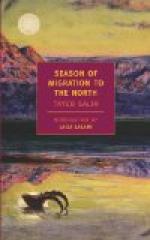Forty years ago, when Bishop Bompas came across a band of these people, instead of being awed at the appearance of a white man, they took him for a son of Cain! Their tradition was that, in the early history of the world, an Eskimo murdered his brother and fled to the inhospitable parts of the earth. The bishop, coming to them from the unknown south, must be a direct descendant of the outlaw, with his hands red with a brother’s blood.
Circling the ocean-edge from Siberia, without doubt this people came originally from Asia, as the Chipewyans did before them and the Crees before that, the more newly arrived in each case pressing their predecessors farther away from the food-yielding ocean. The Anglo-Saxon estimates all habitable land by his ell-measure, fertility of the soil, its ability to yield turnips, potatoes, and flax, and forty-bushel wheat. The measure of desirability of range of northern tribes has another unit—blood, and flesh, and fish. Your Eskimo and Chipewyan and Cree cares not a potato-skin for your waving fields of grain, your apple-orchards and grape-vines. What he is after is blood and blubber and good dripping flesh; these his soul craves in the night season. These peoples who made their way into the continent by the open door at the north have come down through the years toward the habitat of the white man, not because they loved him, but because a stronger tribe has pushed them back from Arctic flesh-pots.
At the Mackenzie mouth we enjoyed the companionship of that courteous Eskimo gentleman, Roxi, and heard the story of his last winter’s larder, but not from his lips. At the beginning of the season Roxi had whale-meat and fresh walrus, and also flour that he had earned from the whalers. In a characteristic burst of generosity he gave the greater part of this to needy members of other tribes who had had poor hunts and who found themselves at the beginning of the Long Night with empty Mother Hubbard cupboards. The Eskimo winter has many mealtimes, and Roxi had but a poor idea of the higher mathematics. Long ere the darkness of the Great Night relaxed its overbearing blackness Roxi got very hungry, and he had no food. Life is dear, even on the edge of things. So into the silence Roxi crept and dug down through the ice and frozen sand to the skeleton of a stranded whale killed three years before. All the sustaining flesh had been eaten from it more than a year ago, but the dried tendons were still there. By chewing these assiduously and picking bones already bare, this generous soul kept life in his body. As I heard the story, the last words of the gallant Sidney dying in agony on Zutphen’s field that another’s thirst might be quenched came across the ocean from another age and a far land, “Thy necessity is greater than mine.” Britain’s heroes, men of the finest mould, manifest on the shores of many seas.




